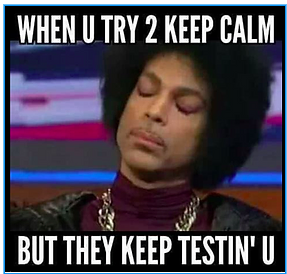Anger Management
Anger is a very powerful emotion that can consume you if you let it. Anger can make us do and say things that we don’t mean, and sometimes things that we do mean but obviously do not want to do/say. It seems like when we are angry it will never go away. It is important that we understand the FOUR stages of anger, and then how to combat it.
The Stages of Anger
Annoyed/Irritated:
This is the first stage and the stage that occurs the most and can last the longest if you allow it. You can become annoyed by internal or external stimuli.
Ex: you’ve coughed 14 times now in a quiet room and you feel another coming and now you feel the need to hold it in (internal).
Or when you’re at work and someone ate the last yogurt though you had your name on it (external).
We experience multiple episodes of annoyance/irritation throughout the day and Both of these instances are minor occurrences, however, your thoughts/reactions to them will have different effects. Holding onto the irritation instead of properly processing or dispelling the feelings can allow for the irritation to build and lead to the next stage.
Coping Skills for Annoyed/Irritated:
- Depending on the situation, you can figure out a way for it to not happen again.
- Leave a note/have a conversation (depending on the situation).
- Honestly, let it go if it’s minor enough.
- Distract yourself.
- Leave the situation alone.
- Avert—walk away if you can.
Frustration:
In this lovely stage, anger is above a mild level and you begin to stress more. You may start to feel that even the smallest thing is irritating the life out of you. This stage usually occurs after you’ve already been through stage one and now you are presented with a task that you either don’t know how to do, unsure of, not confident in doing, or just do not want to do. When a mishap occurs when doing the task, you can feel yourself become unorganized and the stress seeps in. You are also snippier at others in this stage as well. The same goes for interactions with people. You are presented with a person or people who may have differing views, who are terrible communicators, are aggressive/combative, don’t listen, or people you would usually not be around and this causes anxiety due to the unknown and which can lead to frustration. This stage is short-lived. Typically slowing down, taking some deep breaths, and taking a moment to reorganize and think will help you to overcome this stage.
Coping skills for Frustration:
- Take some deep breaths
- Re-organize yourself
- Make a list of what you need to do
- Avert—walk away from the situation, stop talking to the person, go to your own corner
“Pissed Off”:
This stage can be a bit tricky. This stage can be reached after you have held onto the annoyance from stage one and some frustration from stage two and now something else has occurred and added to the anger. This stage can also be reached when something pretty drastic happens that completely takes you out of your comfort zone, overwhelms you with responsibility, emotions, or physical/emotional pain has occurred. Here are some things that can happen in this stage:
- You are very short-tempered.
- Yelling.
- Saying and doing things you don’t mean.
- More profanity than usual.
- Lash out at others very easily.
- Emotional; can experience crying spells.
- Feelings of being “fed up.”
- You can have feelings and thoughts of being physically violent.
- Isolation.
- Combative.
- Defensive.
- Can start to feel like you’re “boiling.”
The length of this stage may vary.
Coping Skills:
- Step away and revisit the situation
- Deep breathing
- Working out
- Taking a walk
- Venting to a friend
- Avert—walk away from the situation
Rage:
It is usually a gradual increase in anger intensity and builds up before reaching this stage. In this stage, you feel like you have lost all control. Some may have destructive behavior like breaking things and can become physically violent. Some people even blackout while enraged. While here, you will feel a lot of physiological symptoms such as getting hot and increased heart rate. Depending on the situation, your survival center can become activated and take over your rational mind before you even have time to rationally think and process the situation. This stage does not happen often, and the duration can vary depending on the situation and environment; lasting from a mere few mins to 2+ hours (if substances are involved, increase the time duration).
Coping Skills:
- ** Leave the situation IMMEDIATELY
- Use a punching bag (use with caution, breathing and heart rate are already elevated and we do not want to overexert ourselves)
- Focused deep breathing
— 4 counts in, 8 counts out slow breathing
— Guided imagery
- Venting
- Taking a cold shower to shock your senses
Anger Management Tips:
1. Identify what stage of anger you are in and figure out which coping skill you will need.
Different stages require different coping strategies. You wouldn’t use your rational mind in the “rage” stage as you would in the “annoyed” stage because rationality has left the building.
2. Learn what triggers your anger, then learn how to either cope or avert
Identifying your triggers is important. Triggers can be people, places, things, thoughts, emotions, situations, etc. They are anything that can cause the emotional response. Once you learn what they are, then you can determine if this is something you can avert or something you will have to cope with.
EX: Going to the bathroom at work on your floor is next to the creepy guy that talks too much and always ask inappropriate questions. If the building has multiple floors or has multiple bathrooms, then you could use the other bathroom instead of that one to avoid that interaction.
3. Understand your body’s warning signs
Your body gives off physiological signs when you are angry such as you are turning red, feeling hot, getting tense, shaking, fists balling, eyes watering, headache, chest tightening, heart rate increasing, breathing increasing, among other things. When you identify these things the easier it will be for you to calm yourself down and think of different ways to handle a situation before it gets out of hand.
4. Use distraction techniques as a coping mechanism when aversion is not possible.
o Games on your phone or computer
o Getting up to stretch
o Taking a walk
o Grabbing a snack
o Watching videos
5. Once you are at a “10” or enraged it is extremely hard calming yourself down. Your body has to naturally calm itself back down.
The best way to handle the burst of anger is to remove yourself completely from the situation. Whether that is completely leaving the house, or walking out of work to cool down, do it. If you remain in the environment, you risk staying “on 10” for longer and possibly making yourself more upset. Try deep breathing by filling your lungs all the way up with air and then exhaling all the air out. Drink water. Go to a gym or use a punching bag where you can physically take the anger out.
6. Keep an Anger Journal
This can allow you to keep track of your triggers, coping skills that help, as well as your anger days. Journaling can also be used as a distraction technique and be calming.
As you begin to understand your anger better and what upsets you, you can better manage and control it. Anger is hard to control and definitely takes time and practice, but it is not impossible.
TiL next time, Peace! ☮




